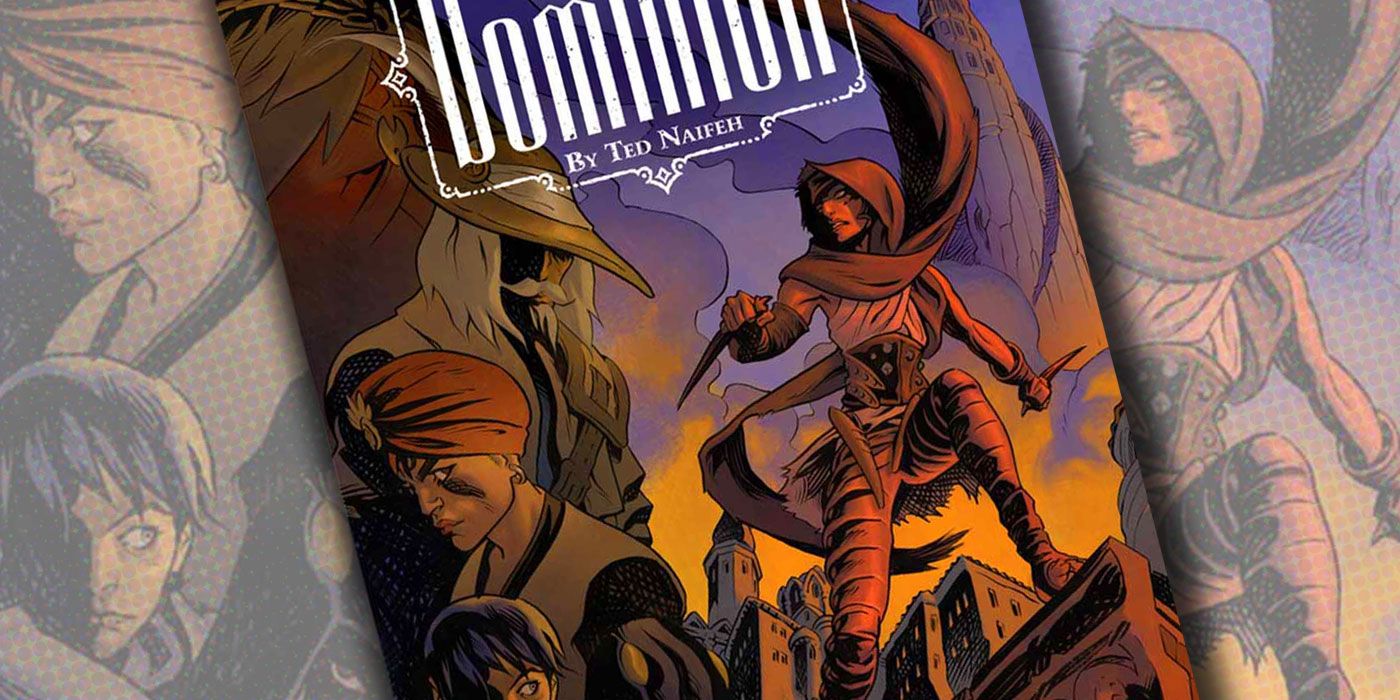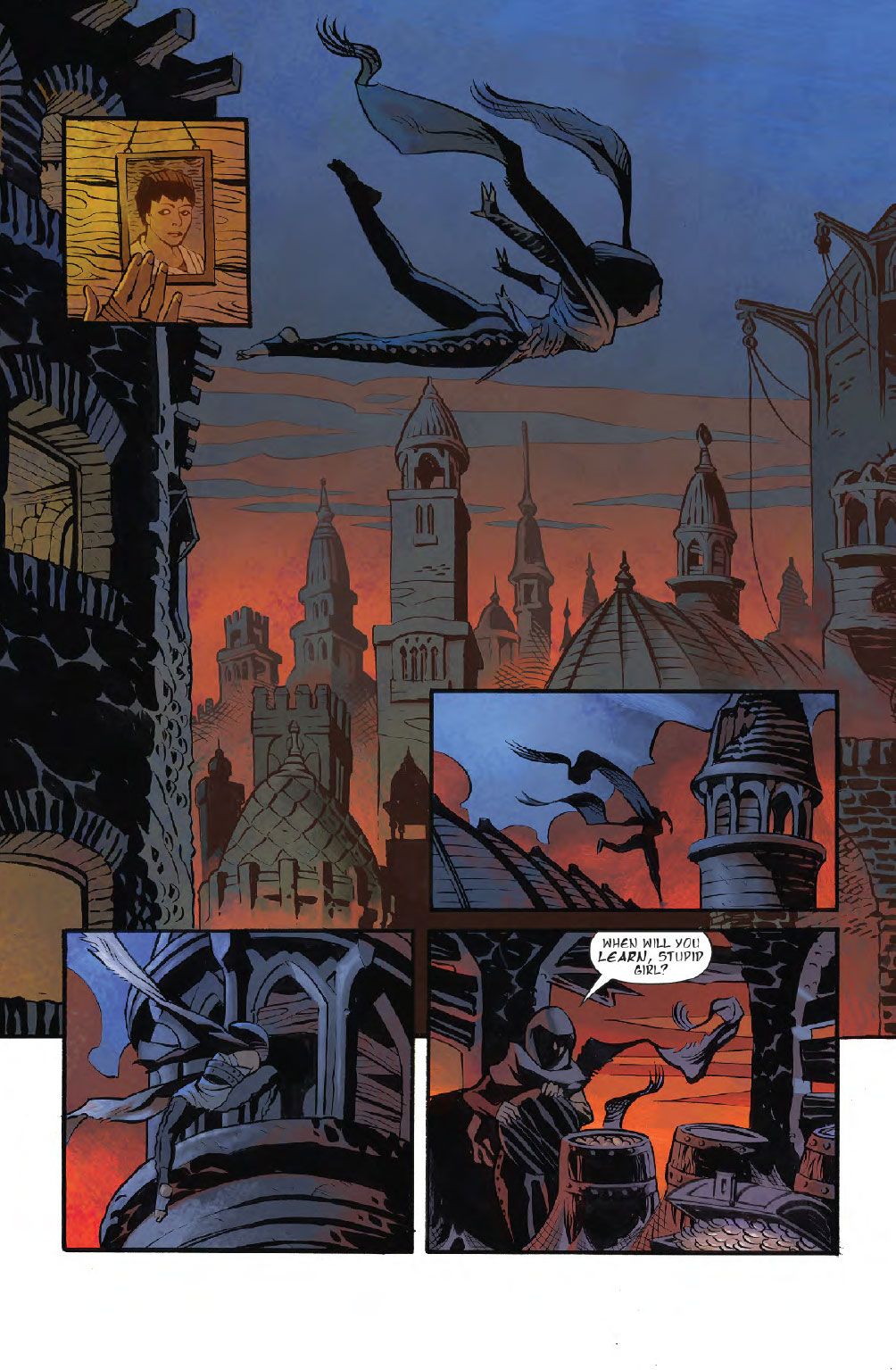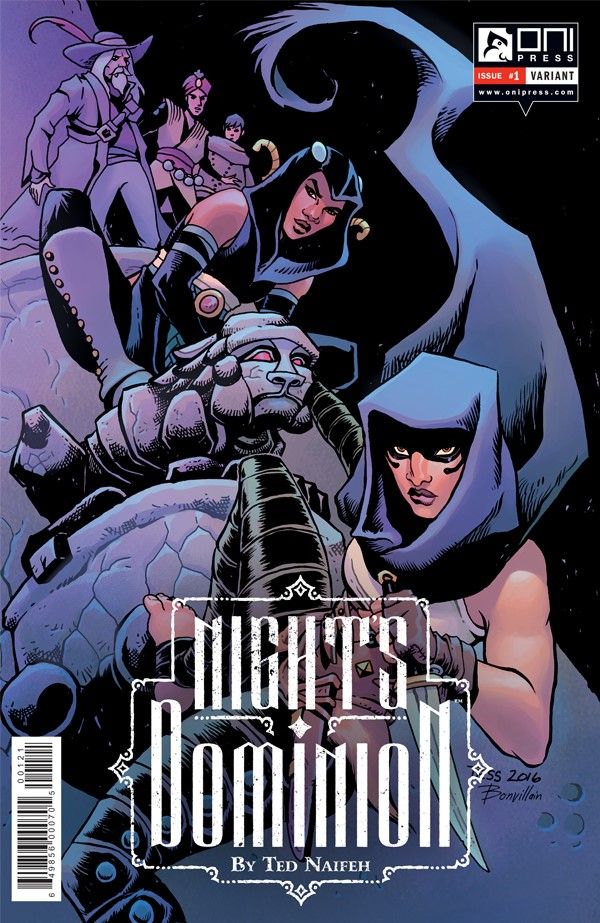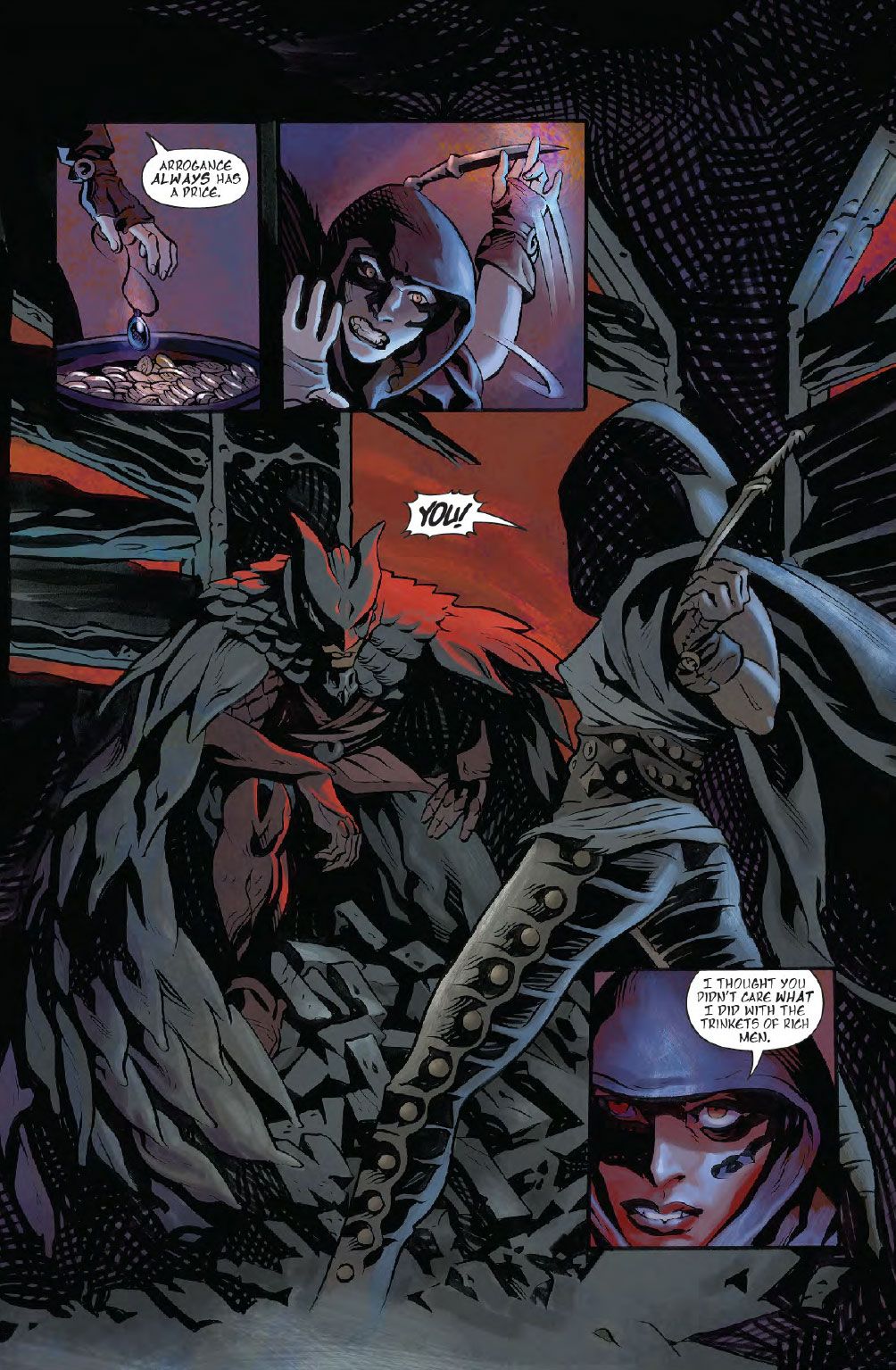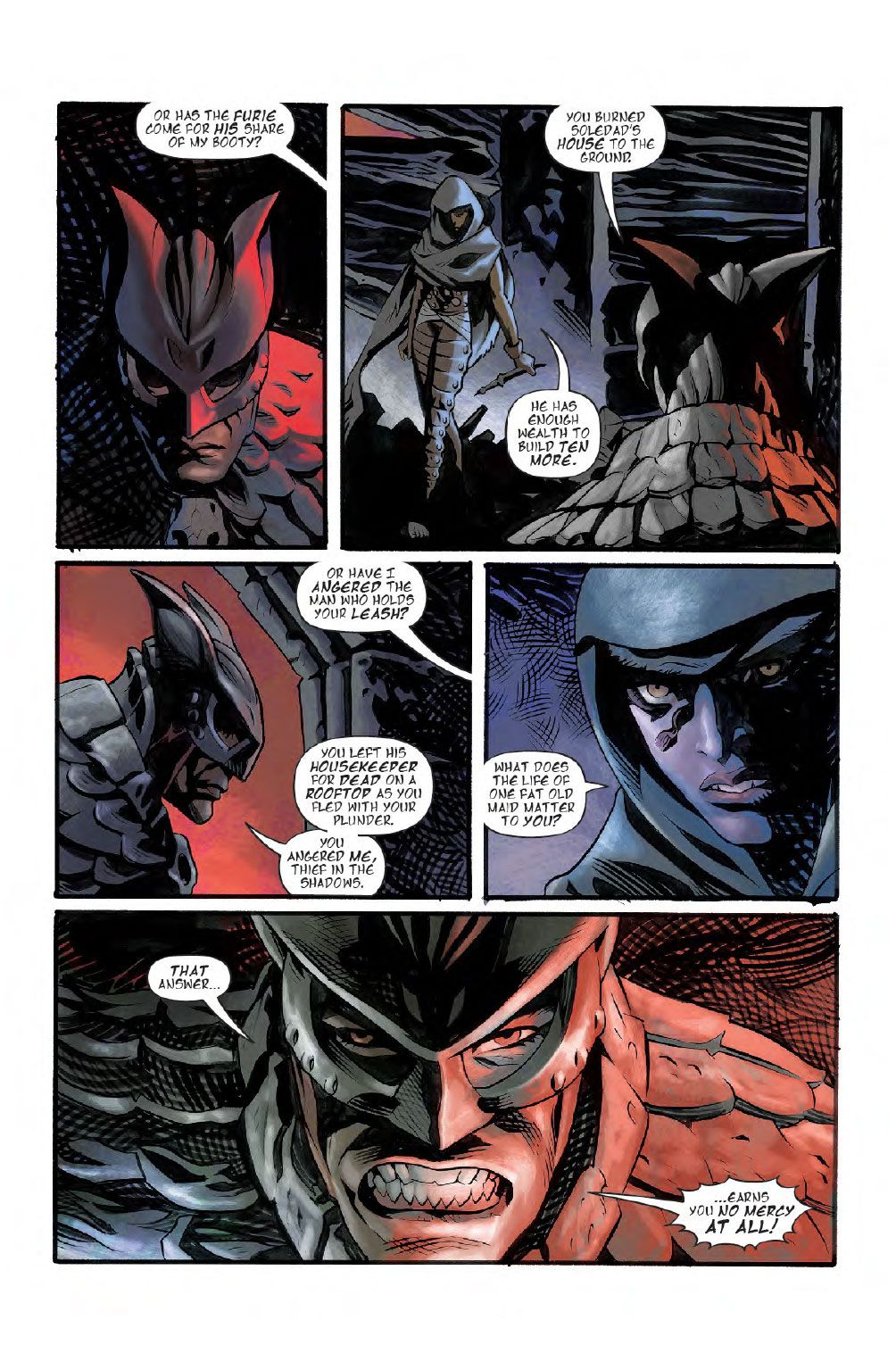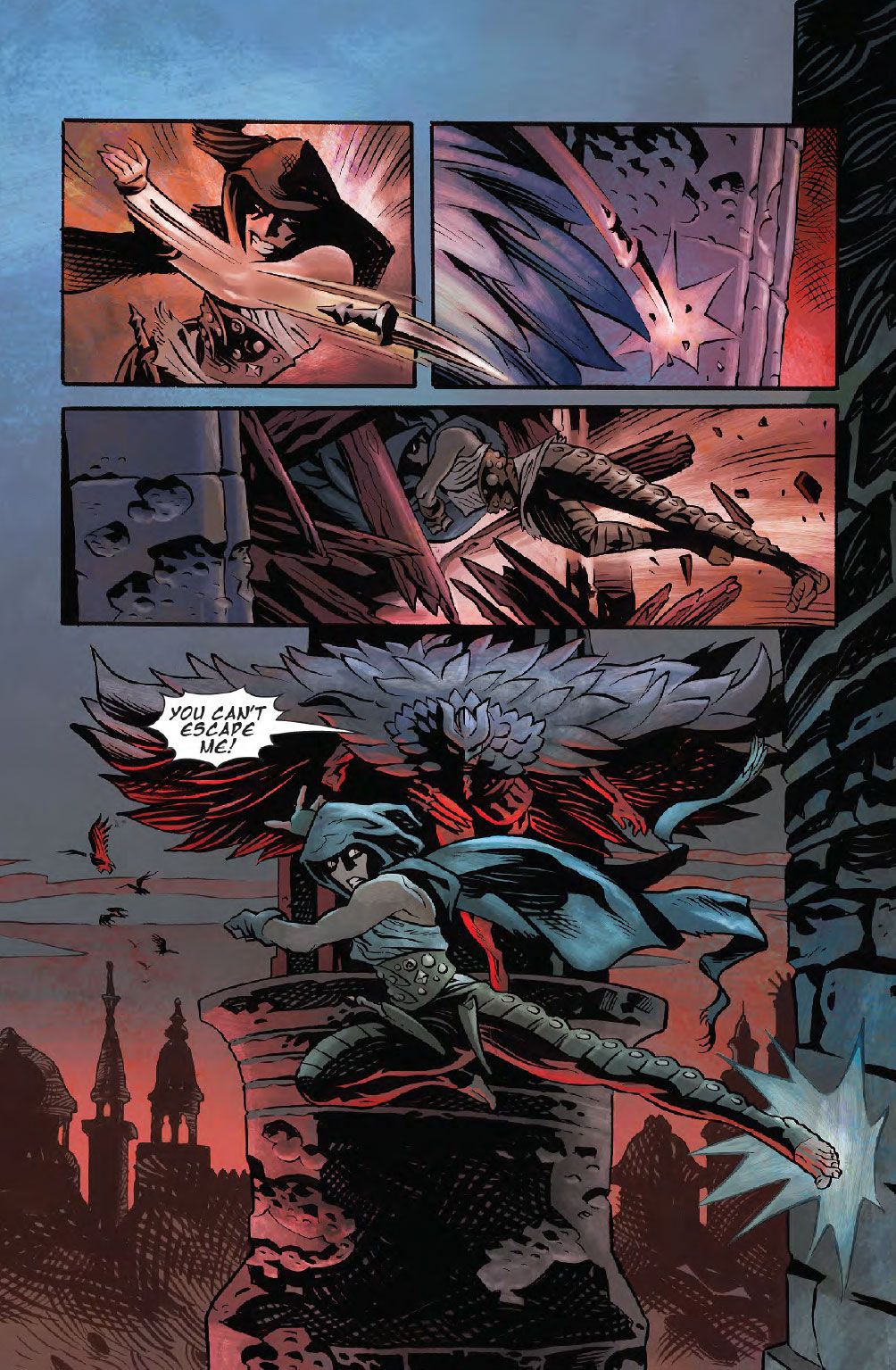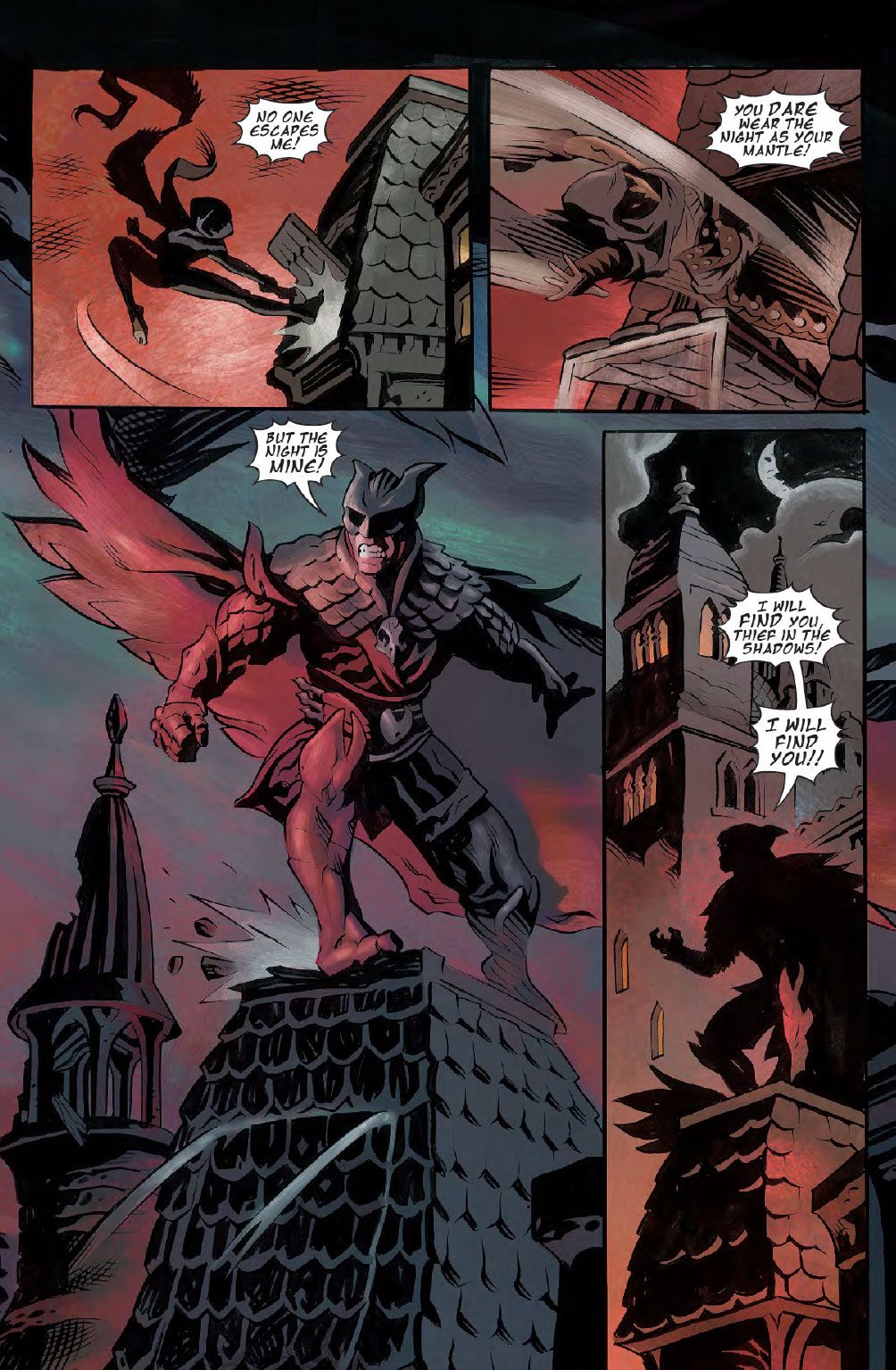Ted Naifeh has earned a reputation as one of the comics industry's most fearless all-ages creators thanks to his work on "Courtney Crumrin" and "Polly and the Pirates." His latest project, however, is aiming for a more mature, though not "adult" voice, as he explores what makes a hero, and how heroism shapes the world.
"Night's Dominion," debuting in September from Oni Press, is Naifeh's spin on superheroes. A group of people with special talents assemble for what appears to be a simple heist, but event launch them on the path to a remarkably different fate. A mysterious bard, a disgraced assassin, a hunted alchemist and a young acolyte looking for answers are joined by a suspicious young woman named Emerane, known as the master thief The Night. By the second issue, everything they thought they'd assembled for is turned upside down, and their union takes on entirely new dimensions.
CBR News: Ted, I read that "Night's Dominion" is your spin on a superhero story, but to me, it felt more like a heist movie, with the assembling team of specialists coming together for the loot. What makes it a superhero story for you?
Ted Naifeh: Good question. The story starts off with a group of desperate characters, each of whom has special skills (which will be put on display in the next issue, when the heist goes down). But what defines a superhero, or a supervillain for that matter, is more than just a special power. It's what they use it for and, more importantly, why.
What I'm presenting here is an origin story, not about how these characters acquire superpowers, but how they transform from desperate criminals to heroes. To me, that's the most important part of a superhero's origin, yet it's often skipped over. There are plenty of stories about ernest, altruistic characters who receive powers out of the blue, and know exactly what to do with them -- and those stories are usually pretty dull. What interests me is what makes people care about this very imperfect world enough to want to save it.
We take that for granted in our heroes, and yet who among us hasn't thrown their hands up and wondered if the world is worth a damn? It's full of idiots and assholes, living incredibly small-minded, selfish lives. Why should we care about them, or risk our lives for them? If I were to start with a collection of altruists, there'd be nowhere to go. I want to start with a bunch of selfish jerks who're fed up with all the other jerks, and take them through a crucible of experience that may well forge them into heroes. I want their heroism to be earned.
Your exploration of how the modern mythology of superheroes fits alongside the classical notion of mythology. As this series unfolds, have you had any revelations on the similarities and differences?
For sure, yeah. For one, the very notion that all people deserve to exist and live out their lives in peace is actually relatively modern. Such an idea would never occur to, for example, Ulysses. Yet to us, it seems obvious. I want to tell a story of a world that has no notion of the rights of man. My heroes must therefore be common folk, destined to be victims of the might-makes-right mentality that dominates a feudal world. Most mythic stories tend to center around the power players of their worlds, the kings, the gods, the scions, but I'm interested in the characters that are fated to be victims, and tell the story of how they rise up and defy the power players. In a modern setting, those are thrilling tales, but they reinforce what we already believe about our world, that we have a say in our fate. In a more ancient, mythic setting, where everyone accepts that the strong exploit or crush the weak, and that's just how things are, a character who rises up in defiance of that, who forces justice on a fundamentally unjust world, and does so from the bottom up, seems to me far more moving. A modern dream in an ancient setting. A character who does that deserves to become legendary.
Emerane -- the thief known as the Night -- is the central character. Being a thief, her role in a heist is apparent, but she's also the loner and skeptic even among a group who mostly work solo. How did her role in this series develop as you got into it?
The whole concept began with the idea of a lone woman in a group of male superheroes. We've seen that before, with Wonder Woman in the early Justice League, Black Widow in the Avengers, Gamora in the Guardians of the Galaxy, the pink Power Ranger, etc. But I always wondered if that lone woman's point of view would be fundamentally different than her male teammates. Yet we rarely get a glimpse into that character's personal world. "Guardians of the Galaxy" delves deeper into the tree's emotional life than the woman's. We are given information about her, but we never really see the adventure through her eyes. If we did, the story might not seem as lighthearted or fun.
With "Night's Dominion," I wanted Emerane to be the heart of the story. Her stakes are very different from the others. They all just need enough money to get back to normal. But to her, what's normal for the city of Umber is horrifyingly, unspeakably unjust. I want to focus on a character to whom restoring the world to order is not a triumph. From her perspective, Umber itself is a villain. If it had a throat, she'd happily slit it. But she also has to ask herself what the alternative is. If she lets the city burn, any hope of justice burns with it. Her only recourse is to try and make it a better place. But as a woman and a peasant, she has no power to do so. The only way someone like her sees justice is by stealing it.
Her rival, the Furie, he looks... familiar, and with dialogue like, "I am the night," he sounds familiar, too!. You're certainly tapping a primary root of superhero myth there, but the main characters aren't modeled after specific modern superhero types. Who is the Furie? Are there more subtle connections between the main cast and modern superhero archetypes?
Sometimes you have to just forget subtlety and go for it. With the Furie, I wanted to show my hand, so the readers have no question about what this book is getting at. But that's also why he's not a central character. I'm not interested in just retelling well-known stories in a superficially altered setting. I wanted to evoke a familiar modern archetype to give the readers a reference point by which they can compare my heroes, and see where I'm changing perspective. The whole point of the story is to call into question the definition of a hero in civilization that's itself unjust. If the crimefighter has his way, the thief must take a minimum wage job and can't make rent. Where's the justice in that?
So, yes, the Furie is an obvious reference. But it's the story and his place in it that makes him a very different character from the one I'm referencing. As for other characters that may have provided subtle or direct inspiration, you'll just have to decide for yourself. That's part of the fun.
Maestro, the bard, is a classic assembler of talent figure, but he also gets the least time in the first issue. We know he knows of a treasure and that he has knowledge of an eclectic group of people, each possessing very particular skill. It seems there is a lot more to his story.
There may be, but I'm playing him pretty mysterious for now. I'm sure you can guess one or two characters that influenced him. I don't want to give too much away just yet; suffice it to say, there's a lot more to the Bard than meets the eye. He's a creature of many secrets. You may never know all of them.
Why did you add coloring to your responsibilities with "Night's Dominion"?
Most comics are very collaborative, and that's part of the magic. You never know what you'll get when two or more different voices come together. But also, I think something magical happens when a single voice produces everything. I'm a pretty good writer, but I'm no Alan Moore or Kurt Busiek. Nor am I on Mike Mignola's or Bill Sienkiewicz's level as an artist. But I think when I do both, something rare and magical happens.
Color makes it even stronger. People underestimate how much color contributes not just to the art, but to the storytelling itself. Everything in comics exists to tell story, and if one person is doing it all, the result is that rare comic that comes from a single, focused creative intent. My voice gets amplified, rather than mixed with other voices saying other things. It's like reading a novel, becoming immersed in the author's singular vision, rather than watching a movie where the actors have a different take on the characters than the director, and the writer is left saying, "Why did they do it like that?" Collaboration can create for some surprising and wonderful accidents. But this time around, I just want to be the one man band playing my own tune in my own way.
How long will this run, and what's next for you?
The current arc is planned for six issues, but I have another three arcs ready to go. I want to go back and forth in time, filling in the history of the characters and exploring how they affect the city they live in. That's something I really want to explore. In the modern superhero comics, you can only allow your heroes to change so much. They can catch the world as it teeters on the brink of Armageddon, but they can't really save it from being our crappy world. If they did, the stories would lose their relevance.
But with "Night's Dominion," the characters can dramatically change the nature of the city they live in, and their place in it. I'm hoping to explore the idea that heroes change the way people see civilization and their place in it. There's a lot of talk in superhero comics about justice and freedom, good and evil, etc. But I really want to dig into what that stuff actually means in tangible terms to everyday folk; how individual acts of heroism make a difference to the whole of society. Heroes give us all a sense of agency. They let us believe that the fate of civilization is, and should be, in our hands. Ultimately, I'm hoping to tell the story of how ancient superheroes inspire the principles of democracy. How long that will take, I have no idea.
Of course, I may need a break from it now and then to do other projects. I have a few, but nothing I want to mention yet. I'm really, deeply passionate about "Night's Dominion," and I really want to see it through to a grand finale.

